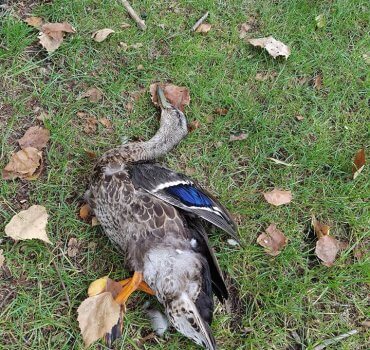

Ducks are dying at Lake Te Ko Utu, with contractors doing twice-daily collections on weekdays.
Community concern is growing over dead ducks and fish accumulating in Lake Te Ko Utu over the weekends, when council contractors are off duty. Cambridge resident Shannon Wilson said she took her kids for a walk around the lake on Saturday afternoon and they counted around 20 dead fish and 15 dead ducks lying in the sun. “It (the lake) smells quite bad at the moment too. Surely the council would know and should have someone checking it more regularly? Surely that amount couldn’t of all died just today?” she asked. “We usually go once or twice a week, but we won’t be going for a while until I know it’s cleaned up. It’s not nice to see at all,” she added, “especially for little kids”.
Waipa district council’s community facilities manager, Bruce Airey, said that contractors have been clearing the bodies of ducks and fish from the lake on weekday mornings and evenings, however this may be extended to include a weekend clean up.
Bruce said that despite public messaging, he did not believe the deaths were due to botulism, because that disease would “wipe out the population”, rather than gradually picking them off, he said.
Nor does the council believe the deaths are due to algal bloom. “The water shows no sign of algal bloom,” he said, adding that “it’s a combination of heat and it’s just what happens…it’s not unusual,” he said. Council has not tested either the ducks or the water, because the die-off happens every year. “We could test for it (botulism) but what could we do about it?” he asked, adding that the outcome of those tests could lead to the closure of parks across the region. “There’s been no record of any human contamination caused by handling dead or dying animals, and I am reluctant to say the deaths are caused by botulism.”
While the public’s feeding of bread to the ducks was not killing them outright, Bruce said it “wouldn’t be helping” the situation. “It’s not good for their diet…feeding them bread will shorten their lifespan,” he said. The council is considering erecting signs discouraging the practice, as it is not only bad for the ducks’ health, but it also causes overcrowding as the birds hang around the area waiting for food and other ducks join them. The ducks kill the grass and make a mess, Mr Airey pointed out, adding that feeding bread to the ducks can also help to foul up the waterway, encouraging the growth of harmful bacteria.
Just as the ducks were dying from heat and bacteria, so are the fish, Bruce added.








